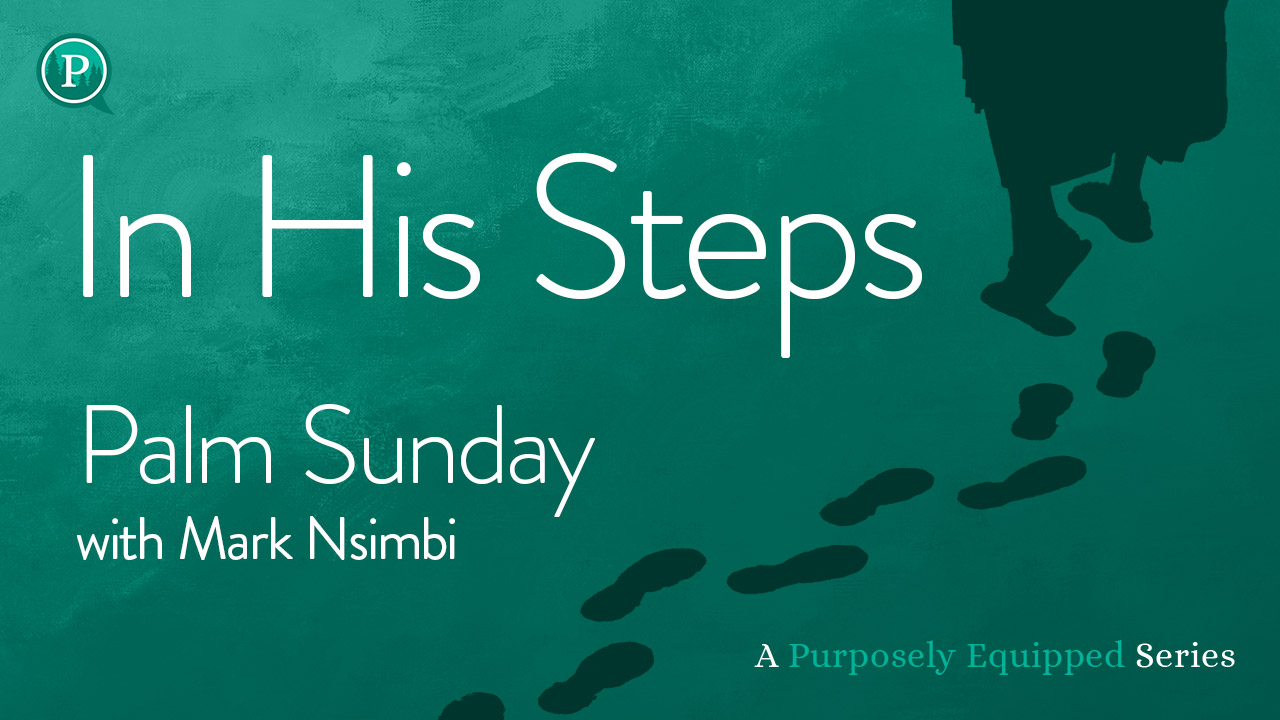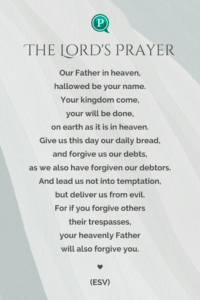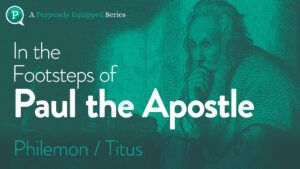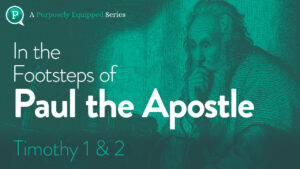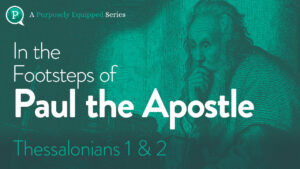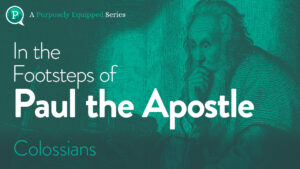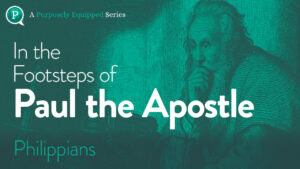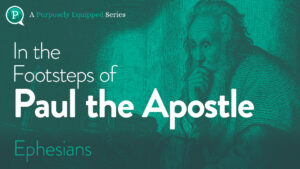Palm Sunday challenges our perspective of Jesus and what he came to do. It’s hard to imagine all the people who greeted him as he came into the holy city of God. People were crying for him to rescue them. They thought he was going to deliver them from the Roman empire. What they didn’t realize was that Jesus wasn’t coming to overthrow the kingdom of the world, but to rescue us from sin. Mark Nsimbi from Washington Cathedral joins the conversation today as we enter the city of Jerusalem and walk In His Steps on Palm Sunday.
Show Notes:
Transcription:
Purposely your life, God’s purpose. Listen at onpurposely.com.
Mark Holland:
And we are on a journey in his steps are series for this passion, week of Christ leading up, of course to Easter. But we start off of course with the first day that we’re familiar with, which is Palm Sunday. And in studio we have a new friend of the radio station. He represents Washington Cathedral in Redmond, working with Tim White there. And it’s Pastor Mark… Why don’t you say your last, how do we pronounce your last name?
Mark Nsimbi:
Nsimbi
Mark Holland:
Nsimbi. Nsimbi. You got it. And where are you from originally?
Mark Nsimbi:
From Kenya. Born and raised in Kenya, but I have Ugandan parents, so I’m Kenyan. Ugandan. You could say.
Mark Holland:
Kenyan. But you’ve been in America for 15, 16 years.
Mark Nsimbi:
16 years now. 16, yep. Since 2007. December.
Mark Holland:
Okay. And you’re pretty new at Washington Cathedral, but you’re being groomed, I guess, to take Pastor Tim’s place eventually.
Mark Nsimbi:
Yes. I’ve been there seven months right now. And by God’s grace, March, 2024, I’ll be stepping into the lead role. And it’s been an exciting journey to be mentored by Pastor Tim.
Mark Holland:
And kind of a challenge too, it’s taken a while for the church to recover from the pandemic, but you’re on the move now.
Mark Nsimbi:
Oh yeah. You could say that. Man. Covid just redefined everything in the church. And so, we are kind of getting back from that, and seeing people slowly coming back into the congregation, and just trying to build up from there. And also realizing that, oh, we also have an online congregation that we need to cater for. And so, just trying to balance how do you cater for both the people who come in person and those who are online. And I believe every church is doing that right now.
Mark Holland:
I think everybody’s going through that to some degree. You bet. Yeah. Yeah. Well, this is obviously a very important week for all churches. Easter week, probably even more important than Christmas. Talk about people who only go to church, it seems like twice a year, Christmas and Easter. Yes. But Easter, even more than Christmas is so central, true to the Christian faith. Tell us a little bit about what is, what’s commonly referred to as Palm Sunday. We think of the palm branches, maybe at your church children wave the palm branches or whatever, but what really historically is Palm Sunday.
Mark Nsimbi:
Yeah. Just like you say, Palm Sunday is that Sunday before Easter, where really all churches around the world come and they celebrate and remember Christ’s triumphal entry into Jerusalem. And so many churches around the world have very many traditions that they use. One of my friends was telling me that at their church, they would weave palm branches into the shape of a cross. And so, it’s like a reminder for them during that week to have the cross before Holy Week. And I was like, oh my goodness, that’s so powerful. And then also I found out that the Orthodox Church in India and the Catholic Church, when they begin the service, they welcome Jesus by saying, Hosanna, blessed is he who comes and who is come and who comes in the name of the Lord. And so, that’s just an amazing thing again that they do.
And then in Kenya, growing up in the church that I served at for 15 years, when people walked in, would hand them palm branches and we would all just wave them out in the airs; we are singing and worship. But also a cool thing about this triumphant entry of Jesus is that it is mentioned in all four gospels. That shows that it was a very important event where people were placing their cloths and palm branches on the ground for Jesus to ride over on a donkey. And this all happened before he was arrested, things went off on holy Thursday. Holy Thursday, he’s arrested, and then he’s crucified on Friday. And so everything just goes south after that. But Palm Sunday actually marks this first week of the Holy Week and the final week of Lent.
Mark Holland:
Well, and Jesus had just come off of some of his biggest miracles, like raise, you mentioned before we went on air, raising Lazarus from the dead. Yes. And he was really getting a reputation as this guy is something different and we think he’s going to be the conquering Messiah that we believed he was going to be, but he obviously had a different plan.
Mark Nsimbi:
That is true. Yeah, that is true. So for me, that’s why I really love Palm Sunday. Once I was preparing as someone, and my eyes just really got opened, and I realized that Palm Sunday many times challenges our perspective and our understanding of who Jesus is. And for me, I really learnt to let go of my expectations and assumptions of who Jesus is, and to actually receive him as the king that God sent him to be, not the king that I want him to be. Because when you look at it, the crowd in Matthew chapter 21, when Jesus was coming, they’re saying Hosanna to the Son of David. Blessed is he comes in the name of the Lord, Hosanna in the highest, and then Jesus enters Jerusalem and he says that the whole city was tied. And they asked, who is this? Who is this? So they’re trying to figure out who he really is.
And so no one knows who Jesus is, not the disciples, not the crowd, not the Pharisees. They all have their own expectations of who Jesus is. So as you said in the book of John, we are told that Jesus had fed the 5,000. There he was. And so some people, and then in the book of Matthew chapter 20, just before this chapter of he had restored the sight of two blind people. So the people who had seen him, and again in John, he had raised Lazarus from the dead. So his name was just all over. And everyone is like, we want this person to become our king. And in the book of John, chapter six, we are told again that after he fed these people, now the people were like, oh, we need to make this person our king. And Jesus was, they came to a point where they wanted to make him king, but he withdrew.
And he said, no, no, no. I’m not going to be the kind of king you guys want me to be. And so when we jump into chapter six of John, and then chapter 21 of Matthew, Jesus is coming in and there’s all these people who are like, here’s a miracle worker. Here’s a revolutionary who’s going to take over the Roman Empire. And then the Pharisees are like, here’s this person who’s a threat to our religion. So, everyone has their own understanding of who Jesus is. They’re like, oh, he is my Jesus who’s going to meet my expectations. So, that’s eyeopening for me on Palm Sunday that people are shouting, Hosanna, hosanna, but hosanna to their kind of king, not the kind of king that God had sent Jesus to.
Mark Holland:
Well, isn’t that even today, that seems to be what people are challenged with. They’ve got their own idea of what they think Jesus is; who he is, who can be for them, how we can get Jesus to do something for us. But he kind of turns tables. He literally turns tables later in this story with the money changers. But yeah, yeah, he has, He’s on a mission. And I think people always think all these people whipped up on Jesus. But he was on a mission. He knew all these people. They felt like they knew who Jesus was. Yes. But he knew who he was, and he was on a mission.
Mark Nsimbi:
He was on a mission. And I like that you say that even today, because when you look at today, many times we look at famous people, like musicians or actors and presidents or sports… I love LeBron James. You know, look at them and we think we know them well, but the truth is we only know them from a distance. We only know them from their social media account. We know them from what social media tells us, but the only people who really know them well are those who are closest to them, close closest to their family members. We only know them from secondary information that we have received. And so that actually impacts our perspective of who they are because we end up seeing people only the way we want to see them, or from the information that we… then some of it may be misinformed information of how we understand who these famous people are. And that’s happening here with the crowd on Palm Sunday, that these people have just had, oh, this guy was a miracle worker, or this person, he’s the Messiah. He’s going to be the one to deliver us. And so everyone is just like, okay, we have our own understanding of who this guy is and yes, that’s who he is. And so we are going to receive him as this kind of person. And so I think today that’s the same thing that maybe we also do with Jesus, that we are like, oh, he’s my kind of king because of the misinformation maybe that we have had. But that’s where I love the theme of this podcast, that it is in his steps, that when we follow in Jesus’ steps, then we really get to see who he is. We really get to understand who he is. He breaks our perspectives and our expectations of who he is when we choose to openly follow him in his footsteps. We become that inner crowd. But what’s also funny is that even his inner crowd didn’t know who he was.
Mark Holland:
Yeah. Those 12 disciples, they seem to be in not in the know completely either. Yeah. And yet Jesus many times, yes, said I, I’m going to be going away from you. Yes. And then I’m going to send the Holy Spirit. Yes. They didn’t get it.
Mark Nsimbi:
They did not get it.
Mark Holland:
And he said, I’m going to be in the earth for couple of days and then I’ll rise again. Yeah. He was telling them, yes, but everybody was going to flee and it’s not going to be what you think. But they didn’t seem to want to receive that.
Mark Nsimbi:
They didn’t. If you think about it as they were receiving him on that what we call Palm Sunday or that trample entry, none of them expected him or wanted him to go to the cross. None of them wanted that. And what’s funny is that his disciples were with Jesus for three years. Yeah, three years. But they didn’t get it. Before the resurrection, and even after the resurrection, they did not get it. They were like, Hey, Jesus, now that you’ve resurrected, are you going to restore the kingdom? And I’m sure Jesus is pulling his hair being like, these guys don’t. But again, I feel like he was so patient and loving, and I was thinking about it, and I was like, the kingdom of God is like when you hear a joke for the first time and then you don’t get it, okay. And then you wake up in the middle of the night and you’re like, and you start laughing and you’re like, oh, yes?
Mark Holland:
Yes,
Mark Nsimbi:
Yes. I see it now. And that’s really what the kingdom of God is in so many ways where you think you get it, but you don’t get it. It’s only later with time. And for me, I think that’s really the beauty of the gospel, and that’s the beauty of who God is, that he’s so patient with us. So understanding that even when we don’t get it, he still loves us just the way we are. He still receives us. He continues to reveal himself and invite us into that journey to follow his footsteps, so that we can really get to know who He is, and I believe that the disciples really got to understand who Jesus was after he had ascended right into heaven. That’s when they’re like, oh, this is what Jesus was talking about. The kingdom of God is not just for the Jews, it’s for everyone, for the gentiles to come in
Mark Holland:
A much bigger vision.
Mark Nsimbi:
It’s a much, much bigger vision. And even the early church itself took time and struggled to understand who Jesus was. It’s not until 325AD when the council of got together to really sit down and say, okay, who is this Jesus? Who is this? Jesus? What is his relationship to the Father? And what’s his nature, both human and divine? And that’s when they came up with the creed, the statement of faith that I believe in God, the father of mighty creator of heaven and death, and in Jesus Christ, who was born of the Virgin Mary, suffered under tPontius Pilot, was crucified, died, and buried in the Holy Spirit. It took 300 years
Mark Holland:
To all get on the same page. Yeah. Yeah.
Mark Nsimbi:
So it did take time for, it takes time for us to really…
Mark Holland:
Do you think that there’s some hope in that too for us today that you make, yes, I receive Jesus, but then it’s a lifetime of coming to under, because you don’t understand everything about God right off the bat, yes. Yes. Takes time. Yes. But you have to, first, I don’t understand it all, but I know God loves me, and I’m not going to make it without him. Yes, that’s kind of the beginning. But then there’s a whole life of what we call sanctification and growth as a disciple.
Mark Nsimbi:
That is true. That is true. And so I think for us to really continue to be disciples. That’s what disciple the word. Disciple means a learner. And I think it’s for us to not come to the place where we are content of saying, you know what? I’ve been a Christian for 20 years. I’ve figured this thing out. I think that’s why it becomes dangerous. And we stop, really, we stop really pursuing who God is. We stop, I’ll keep using this phrase. We stop walking in his steps. When we think we figured him out, then that’s when we stop following him. Right? Because it’s like saying, I figured God out. Who of us has figured God out? None of us. And I think that’s the continual invitation for us, that hey, Jesus is this humble king who came not to overthrow nations, but he came to restore our relationship with God. Jesus came to set us free from fear and to draw us into a loving relationship with God. And for me, that’s really what the message that I hear in Palm Sunday, that Jesus is not this warlord who has come on a horse to overcome the Roman empire, but really he’s this humble king who’s riding on a donkey, a transportation, a peaceful mode of transformation, of transportation. He was already sending that message that, guys, this is the kind of king that I am. This is the kind of king that God is.
Mark Holland:
And a different kind of kingdom. My kingdom is not of this world. He said, yes, yes. And that’s also hard to receive.
Mark Nsimbi:
That that’s hard. It’s a hard pill for us to swallow. Where for me, when I realize it, it’s hard for me to accept that Jesus did not come to meet my expectations. When we pray that prayer, when we pray the Lord’s prayer and we say, Father, let your kingdom come, let you will be done. What we are doing is really surrendering and saying, God, not my way, but your way. And that’s such a hard thing for us to do today. Where we of course want things to happen our way. We want life to go our way. And we’re like, oh, Jesus, as long as things are going fine, then we are good. But again, Jesus uses his will and his way to shape us, to mold us, to build our character, to build our relationship with him. But sometimes, and many times, it’s not what we think it is. And so, that becomes really hard for us to embrace.
Mark Holland:
Well, and again, a real theme of what you’ve shared with us today is our kind of king. So summarize a little bit of what you think we can take from Palm Sunday.
Mark Nsimbi:
Yeah. So from Palm Sunday, I think for me, the invitation really is for us to let go and allow God to be the kind of king that he is. And for us to really let go of… And I think we need to be lifelong learners and let Jesus be his kind of king, or the kind of king that God has sent him to be. And so as we follow him in those steps, we acknowledge, Jesus, I know you. I love you, but I haven’t figured you out. And so, let me follow you in this journey of Palm Sunday, of this Lentin season of diving in deeper and saying, God, give me a new hunger for you. Give me a new, help me break these expectations. Identify and break the expectations that I have of you. That you are always on my side, that, oh, my theological perspectives are your theological perspectives. My political views are your political views. I think we have to let all of those things go and say, Jesus, show me your way. Show me who you are. Being in a posture of surrender and being like a child again and saying, I want to remain like a child. Quiet my soul like the way Sam says, the Sam says, and I want to learn from you. Sit at your feet constantly. And that’s what I believe Palm Sunday is all about, and walking in his steps. That’s the invitation for Palm Sunday. Let us know Jesus anew.
Mark Holland:
And you’ve been listening to the Purposely Equipped series called In His Steps, a Holy Week journey, today featuring Pastor Mark Nsimbi from Washington Cathedral in Redmond. To find out more about the church, visit them at wacathedral.org. Please leave us a review of this message so more people can discover this podcast and find more episodes of Purposely Equipped at onpurposely.com.
Follow this podcast:

